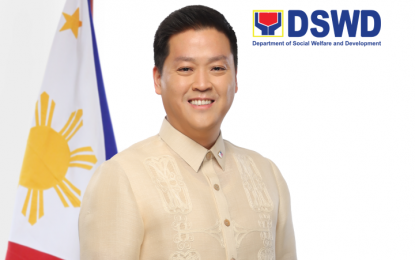
Department of Social Welfare and Development Secretary Rex Gatchalian (Courtesy of DSWD)
MANILA – The Department of Social Welfare and Development (DSWD) on Friday launched the “Sibol: the New SLP (Sustainable Livelihood Program)” to ensure that its livelihood interventions are backed with appropriate innovations and remain responsive to the vast needs of its participants.
During the grand launch of the new SLP at the SM Mall of Asia Music Hall, DSWD Secretary Rex Gatchalian introduced the partners and other stakeholders of the integrated five-year livelihood sustainability plan of the program that will further enhance its implementation to become more effective and relevant.
He said Sibol, the new brand of the program, represents the step-by-step growth in the journey of SLP participants toward an improved well-being with equitable access to livelihood assets and resources.
"Like a plant, we grow with you. We make sure that we plant the seed, we nurture it, we water it, we watch it grow, and we watch it turn into something bigger than what it was. Iyon ang (That’s the) bottom line,” Gatchalian said.
The improvement in the guidelines of SLP implementation was also made as part of the Department’s effort to empower its intended clients, he added.
“We want to make sure that our development programs are not one-shot deals - that we provide the cash and we say goodbye. But rather, we want to make sure it is sustainable and that we partner, monitor and grow the economic enterprise with you,” he said.
The enhanced program aims to expedite the implementation process, rationalize cost parameters, and provide new training or capacity-building activities.
Achieving sustainable livelihood
Under the new framework, program participants will need a longer incubation period of five years, and will be provided with intensified capability-building activities and additional livelihood incentives.
SLP participants, during the first year of the program implementation (Punla), will be prepared and cultivated with the basic knowledge and skills in starting up their own micro-enterprise or in securing employment.
The next two years (Usbong and Sibol) will be focused on maintaining their livelihood, becoming operational and able to secure positive gross sales and net income.
In year four (Yabong), program participants will be expected to prosper and bring their products to a wider and multi-faceted market.
“We want to ensure that we are your partner in growing that small business into a formal enterprise,” Gatchalian said.
The culminating phase (Ani) of the sustainability plan is the actual graduation of the participants, wherein they will be provided with a livelihood grant and incentive worth not more than PHP 250,000 per association.
Strengthening program’s sustainability with partners
During the event, Gatchalian called for the support of the local government units (LGUs), private sector, partner agencies and other stakeholders in strengthening the sustainability of the new SLP.
“Hopefully, everybody will help us grow this vision together,” he said.
Meanwhile, the SM Foundation reaffirmed their 3-decade-long public-private partnership with the DSWD in promoting a sustainable livelihood for the poor and marginalized, and providing a platform for small-scale business owners, such as SLP participants, to introduce their products to a wider market.
“We have worked hand in hand with you in mobilizing trade fairs and sustainable agriculture programs under Kabalikat sa Kabuhayan,” said Steven Tan, the president of SM Supermalls.
Pasay City Mayor Imelda Calixto-Rubiano likewise expressed support for the sustainable livelihood initiatives of the DSWD.
“Let’s transform the lives of the economically deprived and socially vulnerable,” she said.
Various partners such as the Department of Agriculture - Bureau of Fisheries and Aquatic Resources (DA-BFAR), the Cooperative Development Authority (CDA), and the Technical Education and Skills Development Authority (TESDA), among others, were also present to express support for the sustainability plan of SLP during the consignment ceremony.
Showcasing SLP products
Aside from the official launch of the new SLP, the event also provided a venue for SLP Associations to introduce their products to a wider and multi-faceted market.
Program participants from Regions I-XII, National Capital Region (NCR), Cordillera Administrative Region (CAR), Caraga Region, and Bangsamoro Autonomous Region in Muslim Mindanao (BARMM) exhibited their products including hand-crafted bags, fans, hats, traditional costumes, furniture, local delicacies, spread and crops, among others.
The event also featured a SLP bazaar, where the brands and products of the program participants were presented and made visible to the mall goers. (PNA)
